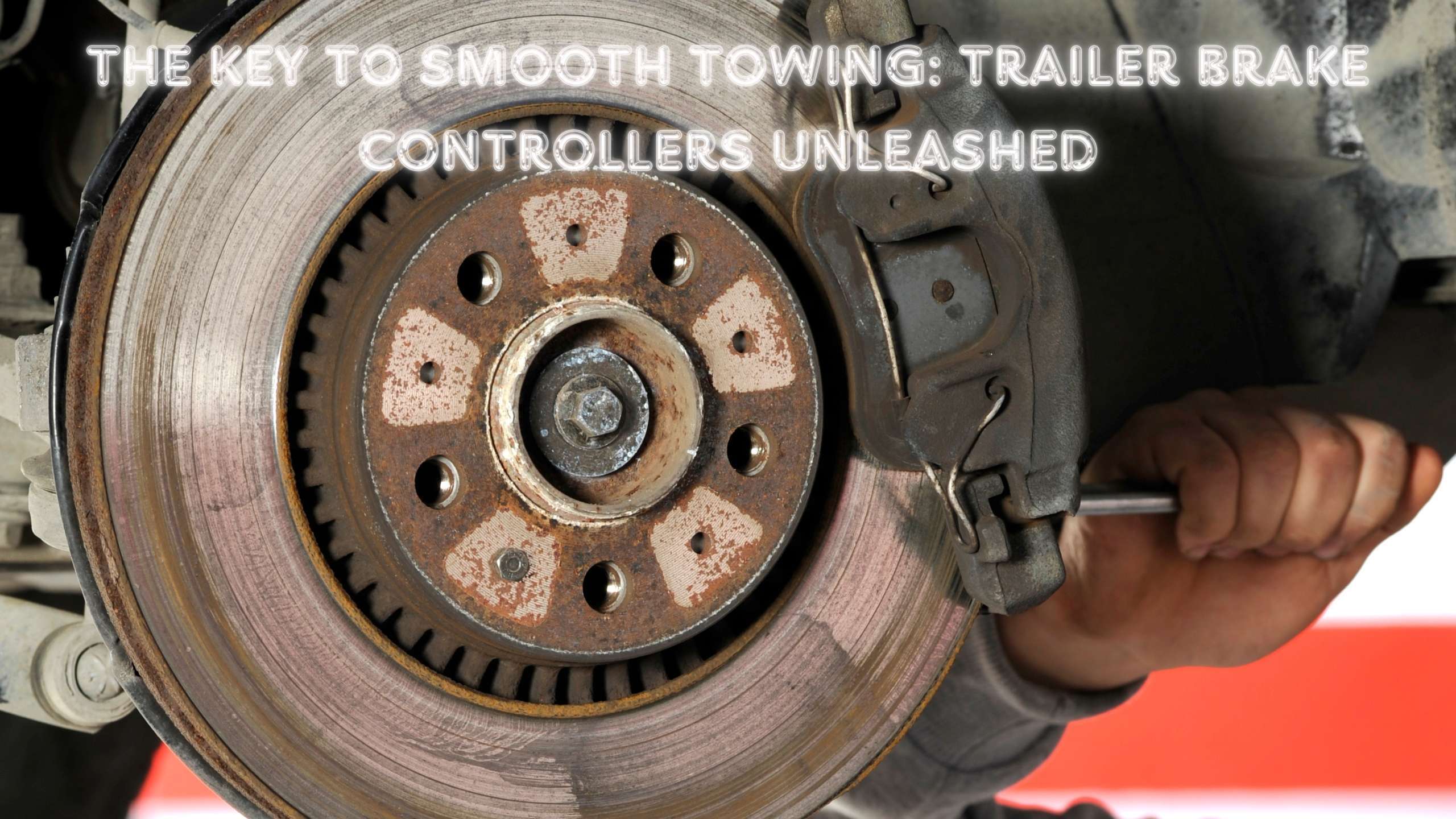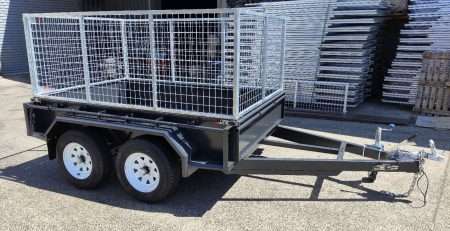
The Key to Smooth Towing: Trailer Brake Controllers Unleashed
Understanding Trailer Brake Controllers
When it comes to towing, safety should always be a top priority. One key factor in ensuring a secure and controlled towing experience is the use of a trailer brake controller. This article will provide a detailed understanding of what a trailer brake controller is and why it’s important for towing.
What is a trailer brake controller?
A trailer brake controller is an electronic device that allows the driver of a towing vehicle to control and activate the electric brakes on a trailer. This critical component gives the driver more control and improves braking performance when towing heavy loads.
Specifically, the controller ensures that the trailer’s brakes are synchronised with the towing vehicle’s brakes, thus improving safety and reducing the risk of accidents. This synchronisation is particularly crucial when towing heavy trailers or in situations where sudden stops or deceleration may be required (Design RV).
In essence, a trailer brake controller is an essential device that operates from inside the towing vehicle, allowing the driver to control and activate the brakes on the trailer.
Importance of Brake Controllers
The critical role of a trailer brake controller cannot be overstated. It is vital for a safe towing experience. The controller provides the driver with the ability to manage the braking force of the trailer, enhancing control and stability even under potentially hazardous conditions.
The use of a trailer brake controller also reduces wear and tear on the towing vehicle’s brakes, as it allows the trailer to contribute to the overall braking force. This is especially relevant when towing heavy loads or navigating steep descents, which can otherwise put significant strain on the towing vehicle’s brakes.
In conclusion, a trailer brake controller is not just an accessory but a crucial component in the safe and effective operation of any towing setup. Whether you’re using a hitch receiver, a trailer hitch lock, or even an electric winch, remember that a brake controller plays an essential role in your towing experience.
Types of Trailer Brake Controllers
The effectiveness of a trailer brake controller depends on its type. There are primarily three types of controllers available on the market: time-delayed controllers, proportional controllers, and inertial controllers. Each type has its own unique operation principle that determines its effectiveness in various towing situations.
Time-Delayed Controllers
Time-delayed controllers are the most basic type of brake controller. They apply a preset amount of braking force to the trailer after a predetermined delay. This means that the braking power is provided at a fixed rate, regardless of the braking force applied by the tow vehicle.
While time-delayed controllers are fairly simple to set up and less expensive compared to other types, they may not provide the most efficient braking experience. This is because the delay and force are fixed, which may not always align perfectly with the towing vehicle’s needs.
Proportional Controllers
Proportional controllers, on the other hand, sense the towing vehicle’s braking pressure and apply the trailer brakes with a proportional amount of force. This means that the trailer brakes are applied in proportion to the vehicle’s braking intensity (CURT Manufacturing).
Proportional controllers generally provide smoother and more efficient braking as they modulate the trailer braking power based on the deceleration of the tow vehicle. This makes them a preferred choice for heavy-duty towing, where precise control is critical.
Inertial Controllers
Inertial controllers, also known as inertia-based controllers, use a built-in accelerometer to measure the deceleration of the towing vehicle. They then apply the trailer brakes accordingly (complete trailers). This type of controller offers the most precise and seamless braking experience, as it adjusts the braking power instantly based on the vehicle’s movement.
Inertial controllers are considered to be the most advanced and precise type of brake controllers, making them an excellent choice for demanding towing situations. They also typically come with more features and settings compared to the other types, allowing for a more tailored towing experience.
By understanding the different types of trailer brake controllers, one can make an informed choice that best suits their towing needs. It’s important to keep in mind that regardless of the type of brake controller used, safe towing also requires other essential accessories such as a trailer hitch lock, an electric winch, and a trailer wiring harness.
Installation and Setup
Once you have chosen your trailer brake controller, the next step is to install it correctly and ensure it is compatible with your towing vehicle. This stage is crucial, as it directly affects the controller’s performance and your safety while towing.
Proper placement of brake controllers
A trailer brake controller should be located within easy reach of the driver and mounted securely to ensure it does not loosen or become damaged during travel. It can be mounted in a variety of locations, including under the dash, on the dash, or even on the trailer itself.
The chosen location should be easily accessible for the driver and should not interfere with normal driving functions. This is to facilitate easy adjustments to the settings while on the move, enhance the performance of the controller, and ensure safe towing.
Compatibility Considerations
While selecting a trailer brake controller, it’s essential to choose a device that is compatible with both the towing vehicle’s electrical system and the trailer’s braking system. This compatibility ensures optimal performance and enhances safety while towing.
It’s advisable to consult the vehicle’s owner’s manual and the brake controller manufacturer’s instructions for proper installation and setup. This step-by-step guide will help you understand the intricacies of the installation process and ensure that the controller is set up correctly for your specific vehicle and trailer.
Remember, a trailer brake controller is an essential device that provides power to the trailer brakes when the tow vehicle’s brakes are applied, allowing for smoother and safer towing. Therefore, correct installation and setup are vital for its efficient functioning.
As you navigate the process of installing and setting up your trailer brake controller, don’t forget to check out other towing accessories like a trailer hitch lock, a trailer wiring harness, and tow hooks to enhance your towing experience.
Safe Towing with Brake Controllers
The use of a trailer brake controller is critical for ensuring safe and effective towing. Its role in managing the braking force of the trailer can make a significant difference, especially when encountering different terrains or towing heavy loads.
Brake Controllers in Different Terrains
Trailer brake controllers are particularly important when towing in hilly or mountainous terrain. In such circumstances, the tow vehicle’s brakes alone may not suffice to provide the necessary stopping power. The trailer brake controller can help reduce the wear and tear on the tow vehicle’s brakes and improve overall braking performance by distributing the braking force between the vehicle and trailer.
It’s also important to adjust the brake controller settings according to the terrain. For instance, one might need to increase the braking power when going downhill to prevent the trailer from pushing against the tow vehicle. Conversely, reducing the braking power may be necessary when driving uphill to prevent premature brake activation.
Remember, safe towing doesn’t stop at using a trailer brake controller. It’s also crucial to ensure that all other towing components, such as the trailer hitch lock, hitch receiver, and trailer wiring harness, are in good working condition.
Brake Controllers for Heavy Loads
When towing heavy loads, the use of a trailer brake controller becomes even more critical. The controller helps distribute the braking force evenly between the vehicle and trailer, which can significantly improve stopping distance and stability.
For heavy loads, it’s advisable to adjust the brake controller settings to allow for more aggressive braking. This helps to ensure that the trailer doesn’t push against the tow vehicle when slowing down or coming to a stop.
Remember to check the condition of your trailer light kit and tow hooks when towing heavy loads. These components are essential for safety and can help prevent accidents while on the road.
By understanding how to use a trailer brake controller effectively in different terrains and for heavy loads, one can ensure a smoother and safer towing experience. Always remember to adjust the settings of your trailer brake controller as needed and to maintain all your towing equipment in good condition.
Maintenance and troubleshooting
Maintaining and troubleshooting a trailer brake controller is as important as understanding its role and operation. Regular adjustment of settings and resolving common issues can help ensure the longevity and efficiency of your trailer brake controller.
Regular Adjustment of Settings
The settings on a trailer brake controller are not a’set and forget’ aspect of towing. They require regular adjustments based on the weight of the trailer and the towing vehicle to ensure effective brake engagement. This is crucial for maintaining optimal braking performance.
Proper adjustment of the trailer brake controller settings ensures that the trailer brakes engage at the right intensity, preventing excessive wear on the brakes and maximising stopping power. The settings allow for fine-tuning the braking force to match the specific towing conditions and load requirements (Capital One).
Regularly checking and adjusting the trailer brake controller settings is crucial for maintaining safe and efficient braking performance while towing.
Common Issues and Solutions
Just like any other element of your towing setup, the trailer brake controller can experience issues. The most common problems include insufficient braking, over-responsive braking, and failure of the controller to engage the trailer brakes. Here are some possible solutions:
- Insufficient braking: If the trailer doesn’t slow down as expected when the brakes are applied, it may indicate that the brake controller settings are too low. Try increasing the controller’s sensitivity or output settings.
- Over-responsive braking: If the trailer brakes engage too abruptly or harshly, it may suggest that the controller settings are too high. Reduce the sensitivity or output settings on the controller.
- Failure to engage trailer brakes: If the brakes fail to engage when the brake pedal is pressed, check the controller’s wiring connections. A loose or damaged wire could be the culprit. If the wiring appears to be in good shape, the issue might be with the brake controller itself. In this case, it may need to be replaced.
Remember, in case of any persistent issues, it’s always a good idea to consult with a professional. Regular maintenance and quick troubleshooting of your trailer brake controller can lead to a longer lifespan of the device and safer towing experiences.
Legal Implications and Requirements
When it comes to towing, safety is paramount. This especially applies to the use of a trailer brake controller, a device that enables a driver to control and activate the brakes on a trailer from inside the towing vehicle. Understanding the legal implications and requirements associated with brake controllers can help ensure a safer, smoother towing experience.
State Laws Regarding Brake Controllers
Trailer brake controllers are required by law in many states when towing a trailer that has electric brakes. These laws vary from state to state, with some requiring brake controllers for trailers above a certain weight limit, while others require them for all trailers with electric brakes.
It’s essential for drivers to familiarise themselves with the specific laws in their state, as well as those in any states they plan to travel through. Non-compliance with these laws can result in fines, penalties, and potential legal issues.
Safety Standards and Compliance
For a trailer brake controller to fulfil its role effectively, it must be installed and connected properly (RVIA). Additionally, the controller’s settings should be adjusted based on the weight of the trailer and the towing vehicle to ensure effective brake engagement.
Furthermore, using a brake controller can significantly enhance safety when towing heavy loads or navigating hilly or mountainous terrain. It helps to reduce the wear and tear on the tow vehicle’s brakes and improve overall braking performance.
Adherence to safety standards and compliance with state laws is not only legally necessary but also crucial for the safety of the driver, passengers, and others on the road. Investing in a high-quality brake controller and ensuring its correct installation and use can make a significant difference in the towing experience.
For more information on towing safety and accessories, check out our articles on trailer hitch lock, electric winch, and trailer light kit.
Author
I am Rahatul Ashiq Tamal. Another author of Muscle Trailers. Muscle Trailers is a well-known trailer brand in Sydney, Melbourne & Adelaide

How to Mount a Spare Tire on Your Trailer: A Simple Step-by-Step Guide
Trailer service centers receive over 1 million phone calls and 1.3 million emails each year about trailer maintenance problems....

How to Fix RV Roof Leaks: Simple Roof Leak Detection Guide for Beginners
Did you know DIY RV roof repairs can cost under $50? But undetected leaks could lead to substantially higher repair...

Starting a Food Truck Business in Australia: From Trailer Selection to Launch
The Australian mobile food market has evolved into a billion-dollar industry. This makes a food truck...
